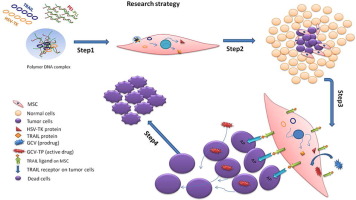Acta Biomaterialia ( IF 9.7 ) Pub Date : 2018-09-15 , DOI: 10.1016/j.actbio.2018.09.015 Yousra Saeed Malik , Muhammad Abid Sheikh , Zhenkai Xing , Zhaopei Guo , Xiaojuan Zhu , Huayu Tian , Xuesi Chen

|
Glioblastoma remains the most resistant malignant brain tumor owing to the lack of an efficient delivery system for therapeutic genes or drugs, especially in outgrowing tumor islands. Cell-based delivery systems such as mesenchymal stem cells (MSCs) are a potential candidate in this regard. Conventionally, MSCs have been genetically modified for cancer therapy by using viral vectors that can illicit oncogenicity and limit their use in clinical trials. In this study, we have used nonviral agents such as the polylysine-modified polyethylenimine (PEI-PLL) copolymer to generate genetically engineered MSCs with suicidal genes, namely, HSV-TK and TRAIL. Our results demonstrated that an intratumoral injection of polymer-double-transfected MSCs along with prodrug ganciclovir injections can induce a significant synergistic therapeutic response both in vitro and in vivo compared to single plasmid transfections or untransfected MSCs. The proliferation marker Ki67 and the angiogenesis marker VEGF were also significantly reduced in treatment groups, whereas the TUNEL assay demonstrated that apoptosis is significantly increased after treatment. Our findings suggest that the PEI-PLL copolymer can successfully modify MSCs with therapeutic genes and can produce a pronounced impact during glioblastoma therapy. This study proposes a potential nonviral approach to develop a cell-based therapy for the treatment of glioma.
Statement of Significance
In this study, we have used a polylysine-modified polyethylenimine polymer (PEI-PLL) copolymer, a non viral transfection agent, for gene delivery in mesenchymal stem cells. These PEI-PLL- transfected mesenchymal stem cells with HSV-TK and TRAIL genes have the potential to treat glioma both in vitro and in vivo. This combinational therapy through PEI-PLL- transfected mesenchymal stem cells can provide cost- effective, low immunogenic, and tumor- targeted delivery of suicideal genes (HSV-TK and TRAIL) for promising glioblastoma treatment.
中文翻译:

聚赖氨酸修饰的聚乙烯亚胺聚合物可产生基因工程的间充质干细胞,用于胶质母细胞瘤的联合自杀基因治疗
胶质母细胞瘤由于缺乏有效的治疗基因或药物递送系统而仍然是最具抵抗力的恶性脑肿瘤,尤其是在肿瘤岛外。在这方面,基于细胞的递送系统(例如间充质干细胞(MSC))是潜在的候选者。常规上,已经通过使用可以非法致癌并限制其在临床试验中使用的病毒载体对MSC进行了基因改造以用于癌症治疗。在这项研究中,我们使用了非病毒剂,例如聚赖氨酸修饰的聚乙烯亚胺(PEI-PLL)共聚物,以产生具有自杀基因(即HSV-TK和TRAIL)的基因工程MSC。我们的结果表明,与单质粒转染或未转染的MSC相比,瘤内注射聚合物双转染的MSC与前药更昔洛韦注射液在体外和体内均可诱导显着的协同治疗反应。在治疗组中,增殖标志物Ki67和血管生成标志物VEGF也显着降低,而TUNEL测定表明,治疗后细胞凋亡显着增加。我们的发现表明,PEI-PLL共聚物可以成功修饰治疗基因的MSC,并在胶质母细胞瘤治疗期间产生显着影响。这项研究提出了一种潜在的非病毒方法来开发基于细胞的神经胶质瘤治疗方法。在治疗组中,增殖标志物Ki67和血管生成标志物VEGF也显着降低,而TUNEL测定表明,治疗后细胞凋亡显着增加。我们的发现表明,PEI-PLL共聚物可以成功修饰治疗基因的MSC,并在胶质母细胞瘤治疗期间产生显着影响。这项研究提出了一种潜在的非病毒方法来开发基于细胞的神经胶质瘤治疗方法。在治疗组中,增殖标志物Ki67和血管生成标志物VEGF也显着降低,而TUNEL测定表明,治疗后细胞凋亡显着增加。我们的发现表明,PEI-PLL共聚物可以成功修饰治疗基因的MSC,并在胶质母细胞瘤治疗期间产生显着影响。这项研究提出了一种潜在的非病毒方法来开发基于细胞的神经胶质瘤治疗方法。
重要声明
在这项研究中,我们已使用聚赖氨酸修饰的聚乙烯亚胺聚合物(PEI-PLL)共聚物(一种非病毒转染剂)在间充质干细胞中进行基因传递。这些带有HSV-TK和TRAIL基因的PEI-PLL转染的间充质干细胞具有在体内外治疗神经胶质瘤的潜力。通过PEI-PLL转染的间充质干细胞进行的这种联合疗法可提供具有成本效益,低免疫原性和肿瘤靶向性的自杀基因(HSV-TK和TRAIL),用于有希望的胶质母细胞瘤治疗。



























 京公网安备 11010802027423号
京公网安备 11010802027423号